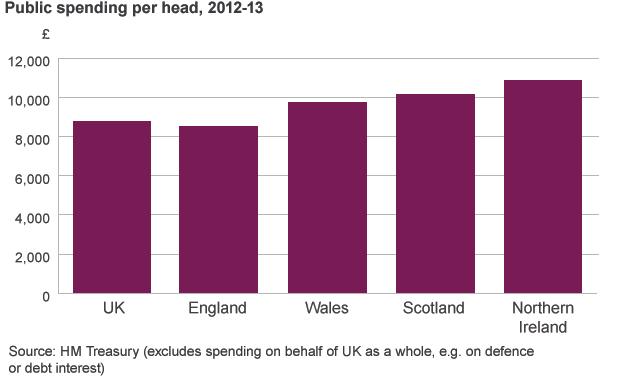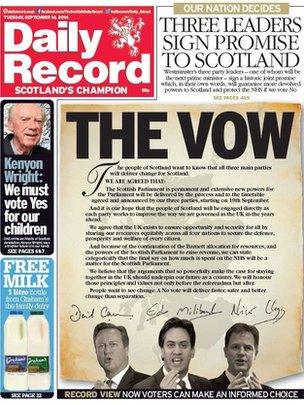Devolution: What's the Barnett formula?
- Published

The Barnett formula is used to calculate overall public spending in Scotland, Wales and Northern Ireland
Political leaders have vowed to keep in place a spending formula that favours Scotland. But what is the Barnett formula and why is it controversial?
What is the Barnett formula?
The Barnett formula is a system of grants which dictates the level of public spending in Scotland, Wales and Northern Ireland.
Under it, extra funding - or cuts - from Westminster are allocated according to the population size of each nation and which powers are devolved to them.
When the UK government increases or decreases funding for departments such as health and education in England, the Barnett formula is used to decide how much devolved governments will receive.
The formula is named after its inventor, the former Labour Chief Secretary to the Treasury Joel Barnett, who devised it in the late 1970s.
Why is it controversial?
The main reason the formula has come under criticism is that public spending per head is considerably different in different parts of the UK. It has typically been 20% higher in Scotland than in England, for example.
That's left some countries feeling short changed.
Politicians in Wales - where overall GDP remains lower than any other part of the UK - have said the country misses out to the tune of £300m a year.
Some argue a needs-based system - which would take into account factors such as the age of the population and levels of poverty - would be a fairer formula.
What does each country receive?

The figures vary slightly every year, but in 2012-2013 , externalNorthern Ireland got the most - £10,876 per head.
Scotland got £10,152 per head and Wales, despite being much poorer, got £9,709. England received £8,529.
The UK average was £8,788.
Why are people talking about it now?

The pledge was made in the Daily Record
Prime Minister David Cameron, Labour leader Ed Miliband and Liberal Democrat leader Nick Clegg vowed that the Barnett formula would continue in the lead up to the Scottish independence referendum.
That's despite the Conservative Party saying the formula was reaching the end of its useful life in 2010, and the Liberal Democrats announcing a manifesto pledge (which was later dropped) to replace it with a needs-based approach in 2011.
The vow has led to some calls for other countries, particularly Wales, to get more money.
The Labour Party has said it will look at ways of closing the gap, the Lib Dems have suggested "topping it up", while Plaid Cymru wants the system replaced altogether.
Why was the Barnett formula created?
The Barnett formula was designed in 1978 as a temporary solution to settle rows about government spending allocations.
It was also partly created to allow for Scotland's lower average incomes, larger physical area, and healthcare and housing needs.
Was Scotland already getting more money?
Yes, Scotland's public spending windfall goes back more than a century.
In the 1880s the "Goschen Proportion" - which was named after the then Chancellor George Goschen - channelled £11 to Scotland for every £80 spent in England and Wales because there were roughly 11 Scots for every 80 people in England and Wales.
Scotland's population fell below 11/80th of the population of England and Wales in 1901, so it started receiving more public spending per head than England.
The proportion was the first time the UK government had used a formula to distribute public spending across the constituent nations.

Lord Barnett in 1986
What does Lord Barnett think of his formula?
Lord Barnett, now 91, never intended his formula to last for 36 years.
He recently told the BBC Radio 4's World Tonight programme it was "grossly unfair" and repeated his call for it be scrapped.
He also told the Daily Telegraph, external introducing it was a "terrible mistake" which had become a national and personal "embarrassment".